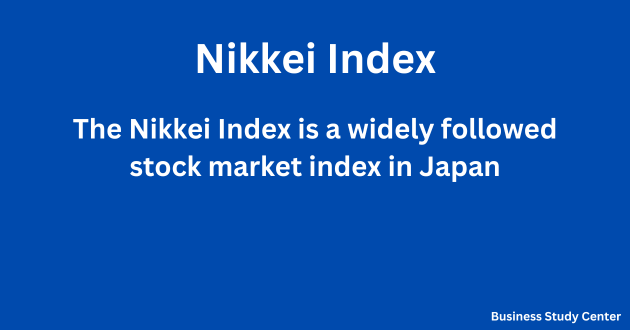
Introduction
The Nikkei Index, also known as the Nikkei 225, is a prominent stock market index that serves as a key indicator of the Japanese equity market and the overall performance of the Japanese economy. In this comprehensive guide, we will delve into the various aspects of the Nikkei Index, including its history, composition, calculation methodology, and investment opportunities. We will also explore the comparison between the Nikkei Index and TOPIX, the currency risk involved in international trading, and the availability of derivative indices and products. Additionally, we will provide insights into the intellectual property rights associated with the Nikkei Indexes and how to obtain relevant data. Let’s begin by understanding the Nikkei Index in detail.
Understanding the Nikkei Index
History and Significance
The Nikkei Index, officially known as the Nikkei Stock Average, has a rich history dating back to its establishment in September 1950, with retrospective calculation from May 1949. It was developed as part of Japan’s post-World War II reconstruction and industrialization efforts. The index was initially named the Nikkei Dow Jones Stock Average, derived from its collaboration with Dow Jones & Company. However, it is now named after the Nihon Keizai Shimbun, commonly known as Nikkei, which sponsors the index’s calculation.
The Nikkei Index holds significant importance as the oldest stock index in Asia and serves as a benchmark for the Japanese stock market. It comprises 225 blue-chip companies listed on the Tokyo Stock Exchange, representing various sectors such as technology, consumer goods, financials, transportation and utilities, capital goods/others, and materials. Some well-known companies listed in the Nikkei Index include Sony Corporation, Canon Inc., Nissan Motor Corporation, Mazda Motor Corporation, and Panasonic Corporation.
Composition and Calculation
Unlike many other stock market indices, the Nikkei Index follows a price-weighted methodology, where the index value is an average of the share prices of all the constituent companies. This means that higher-priced stocks have a more significant impact on the index’s movement. The index is denominated in Japanese Yen, reflecting the local currency’s influence.
The composition of the Nikkei Index is reviewed annually in September, with any necessary changes implemented in October. The constituent stocks are ranked based on their share prices rather than market capitalization, which is a common practice in most other indices. This unique approach can lead to variations in performance compared to indices that consider market capitalization.
Comparing the Nikkei Index and TOPIX
Methodology and Differences
While the Nikkei Index represents Japan’s top 225 companies based on share price, the Tokyo Stock Price Index (TOPIX) takes a different approach. TOPIX is a broader index that includes all domestic companies listed on the Tokyo Stock Exchange’s First Section, totaling over 2,000 companies.
The Nikkei Index’s price-weighted methodology means that stocks with higher prices have a more significant influence on the index’s movement. In contrast, TOPIX utilizes a market capitalization-weighted methodology for all the stocks in the First Section. This means that companies with larger market valuations, such as financial institutions, have a greater impact on TOPIX.
Due to these differences in methodology and composition, it is often argued that TOPIX provides a more comprehensive representation of Japan’s stock market. However, the Nikkei Index remains the most recognized and widely used indicator of the Japanese equity market.
Investing in the Nikkei Index
Exchange-Traded Funds (ETFs)
Individual investors who wish to gain exposure to the Nikkei Index can consider investing through exchange-traded funds (ETFs) that track the index’s performance. ETFs are financial products that comprise a selection of stocks or other securities. They are traded on stock exchanges and provide investors with an opportunity to participate in the performance of the underlying index.
Several ETFs are available that track the Nikkei Index and trade on the Tokyo Stock Exchange. Some popular options include Blackrock’s iShares Nikkei 225, Nomura Asset Management Nikkei 225 Exchange Traded Fund, and Daiwa Asset Management ETF. These ETFs allow investors to gain diversified exposure to the Nikkei Index without directly purchasing individual stocks.
Maximizing Opportunities
Investors looking to maximize their investment opportunities in the Nikkei Index should consider conducting thorough research and analysis. It is essential to monitor the performance of the index’s constituent stocks and stay informed about market trends and economic indicators that may impact the Japanese equity market.
Additionally, investors may benefit from understanding market dynamics, employing risk management strategies, and diversifying their portfolios to mitigate potential risks. Seeking guidance from financial advisors or professionals experienced in Japanese markets can provide valuable insights and help make informed investment decisions.
Currency Risk and International Trading
Yen Denominated ETFs
When investing in Nikkei Index ETFs listed on the Tokyo Stock Exchange, foreign investors are exposed to currency risk due to the fluctuation between the Japanese Yen and their local currency. Exchange rate fluctuations can impact the returns on investments made in yen-denominated ETFs. If the local currency appreciates against the yen, it may result in losses, reducing any gains made in the Tokyo Stock Exchange.
To manage currency risk, investors can consider utilizing yen-hedged ETFs. These ETFs employ strategies to mitigate the impact of exchange rate fluctuations, providing a more stable investment option for foreign investors.
Hedging Strategies
Investors looking to hedge against currency risk can explore various hedging strategies. One approach is to enter into currency futures contracts that allow investors to lock in exchange rates for future transactions. Another option is to use currency options, which provide the right (but not the obligation) to buy or sell a currency at a predetermined price within a specified period.
Hedging strategies can help investors safeguard their investments from the adverse effects of currency fluctuations. However, it is essential to carefully evaluate the costs and potential benefits of implementing such strategies.
Derivative Indices and Products
Options, Futures, and Warrants
In addition to ETFs, various financial products are available that are based on the Nikkei Index. These include options, futures, and warrants, which allow investors to speculate on the future direction of the index or specific stocks within the index.
Options provide the right, but not the obligation, to buy or sell the underlying asset at a predetermined price within a specified period. Futures contracts, on the other hand, obligate the buyer and seller to transact the underlying asset at a future date and predetermined price. Warrants are financial instruments that provide the right to buy or sell the underlying asset at a specific price within a specified period.
These derivative products offer opportunities for investors to engage in more sophisticated trading strategies and potentially enhance their returns. However, they also carry higher risks and require a good understanding of market dynamics and risk management techniques.
Global Trading Opportunities
The popularity and significance of the Nikkei Index have led to the development of derivative products trading on stock exchanges worldwide. Options, futures, and ETFs tracking the Nikkei Index are available in countries such as the United Kingdom, the United States, France, Switzerland, Italy, and Germany. This global accessibility provides investors with opportunities to participate in the Japanese equity market regardless of their geographic location.
Nikkei Indexes and Intellectual Property Rights
License Agreement
Nikkei Inc. retains all intellectual property rights to the Nikkei Stock Average and other Nikkei Indexes. For individuals or businesses interested in using the Nikkei Indexes for various purposes, including display, non-display usage, or creation of financial instruments, Nikkei provides information on approval procedures and licensing agreements. It is essential to comply with these guidelines to ensure the appropriate use of the Nikkei Indexes.
Provision of Index Data
To use basic data related to the Nikkei Indexes for business purposes, such as index constituents, stock prices, dividends, and weights, certain procedures need to be followed. Nikkei provides guidance on accessing and utilizing this data, which is vital for calculating the Nikkei Stock Average and other Nikkei Indexes accurately.
Frequently Asked Questions (FAQ)
For further clarity and understanding, we have compiled a list of frequently asked questions related to the Nikkei Index and its various aspects. These FAQs cover topics such as the index’s calculation methodology, licensing agreements, usage of the index data, and more. Please refer to the FAQ section for answers to common queries and doubts.
Contacting Nikkei Inc.
If you have any specific questions or require further information about the Nikkei Indexes, licensing agreements, or any other related matters, please feel free to reach out to Nikkei Inc. through their designated contact channels. The contact details can be found on their official website, and their team will be happy to assist you with your queries.
In conclusion, the Nikkei Index serves as a vital indicator of the Japanese stock market and provides investors with opportunities to participate in the performance of the Japanese economy. By understanding the index’s composition, calculation methodology, and available investment options such as ETFs and derivative products, investors can make informed decisions and potentially benefit from the opportunities presented by the Nikkei Index.
Disclaimer: This article is for informational purposes only and should not be considered as financial advice. Investing in the stock market involves risks, and individuals should conduct their own research and consult with financial professionals before making any investment decisions.


